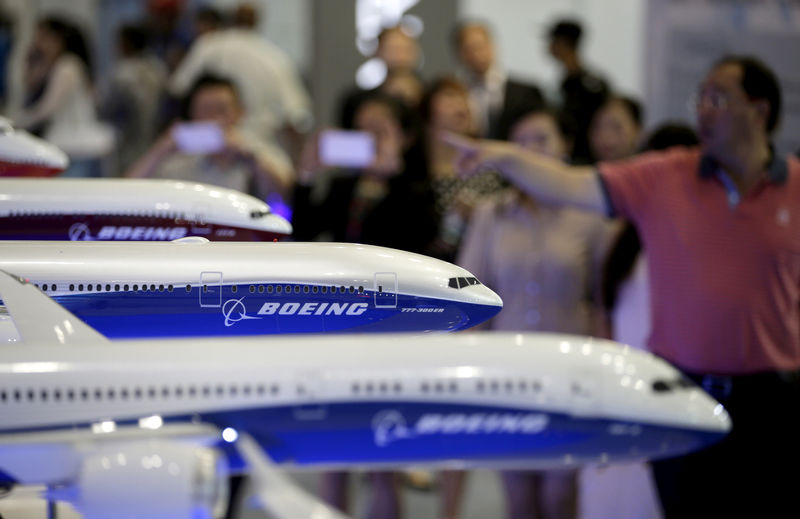By David Ljunggren and Allison Lampert
OTTAWA/MONTREAL (Reuters) - Canada last month attempted to end a deepening dispute with Boeing Co (N:BA) by suggesting it could withdraw a threat not to buy Super Hornet jets if the U.S. firm dropped a trade challenge against Canadian planemaker Bombardier Inc (TO:BBDb), three people with knowledge of the matter told Reuters.
The informal proposal would have created an unusual link between trade and arms deals, which are typically separated in international negotiations, trade analysts said, and showed the lengths Canada is willing to go to protect Bombardier jobs.
Ottawa froze talks on a planned purchase of 18 F-18 Super Hornet jets for more than $5 billion after Boeing in April launched a trade challenge accusing Bombardier of dumping its new CSeries airliners into the U.S. market.
Senior Canada government officials and Boeing met last month to discuss the disputes, officials said.
One of the sources familiar with the discussions said Ottawa's proposition to Boeing had been "if we resolve the challenge, that will allow us to resume our discussions on the F-18," but said Boeing dismissed the idea of linking the two disputes.
Boeing walked away with none of the issues resolved, Canada's ambassador to the United States told reporters this week, without elaborating.
A Boeing spokesman declined to comment.
One industry source said Boeing sees the alleged CSeries dumping as a long-term threat to its civilian airliner business and has shown little interest in a compromise, even at the risk of losing the military contract.
"The Canadian government is trying to link the F-18 file with the Boeing-Bombardier dispute. The position of Boeing and the U.S. government is that they are not linked," said a second source directly familiar with the matter.
The office of Canadian Foreign Minister Chrystia Freeland, who has overall responsibility for relations with the United States, said it could not confirm the sources' account.
Time is running out for Canada to end the dispute.
The U.S. Department of Commerce is due to hand down its initial ruling on Sept. 26 on whether to impose countervailing duties on the CSeries, a decision that could dampen airlines' demand for the 110-130 seat jets in the key U.S. market.
That decision could also boost Boeing's leverage in any future talks with Canada, though the duty would only potentially apply after a final ruling by the U.S. International Trade Commission (ITC) in 2018.
Bombardier spokesman Mike Nadolski said on Friday the company is focused on the 2018 ruling and noted Boeing did not take part in the Delta competition that the CSeries won.
"It's really hard to see how they are harmed," he said in an email.
Dan Pearson (LON:PSON), a former ITC chairman, said it was likely the Commerce Department would determine preliminary duties against Bombardier, giving Boeing leverage in any negotiations.

Boeing has accused Bombardier of imitating European rival Airbus SE (PA:AIR) by trying to muscle into the U.S. market with cut-rate pricing to win a key April 2016 order from Delta Air Lines Inc (N:DAL). The first source said Canada ideally still wanted to buy the F-18s rather than looking for other options. "(Boeing has) put us in a situation where they're forcing us to make hard choices ... we can't do business with someone who is actually killing our industry," said the source.
(With additional reporting from Tim Hepher in Paris; Editing by Denny Thomas and Meredith Mazzilli)